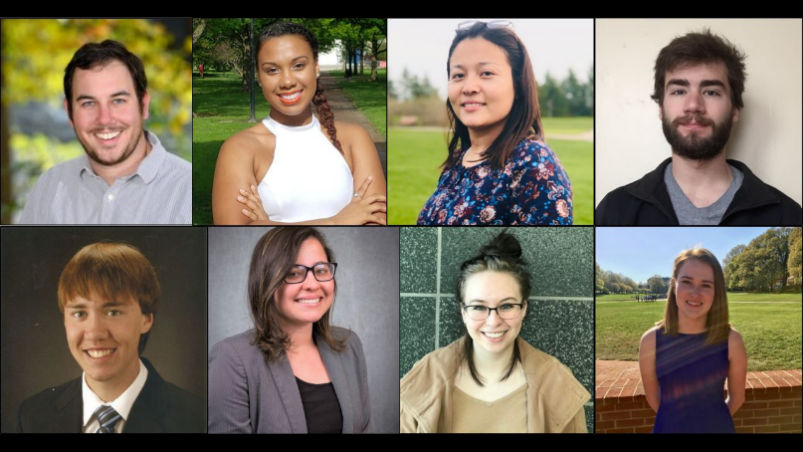Fall 2020 eNewsletter
 2020 Great Lakes Summer Fellow Video Series
2020 Great Lakes Summer Fellow Video Series
In partnership with NOAA’s Great Lakes Environmental Research Laboratory (GLERL), CIGLR hosts a cohort of students each summer to participate in the Great Lakes Summer Fellows Program. This video series highlights CIGLR’s 2020 fellows, their research, and the virtual fellowship program that included career training opportunities to equip students with the knowledge and skills to be the next generation of Great Lakes scientists. Interested in the 2021 Great Lakes Summer Fellow Program? Click here to learn more and apply.
Chanse Ford was mentored by Lacey Mason (GLERL), Lindsay Fitzpatrick (CIGLR), and Drs. Brent Lofgren (GLERL), Lauren Fry (GLERL), and Yao Hu (formerly CIGLR, currently University of Delaware). He helped to evaluate the next generation runoff risk tools that will help farmers determine the best time to apply fertilizers based on weather forecasts and soil moisture conditions. Chanse says, “My favorite part of this fellowship has been the opportunity to work with NOAA and CIGLR scientists on an amazing and thoughtful project that will be useful for farmers within the Great Lakes and beyond.”
Brenna Friday was mentored by Dr. Michael Fraker (CIGLR) to identify climatic influences on antipredator phenotypic plasticity in larval amphibians and clarify how the structure and function of many ecosystems are impacted by future aquatic conditions. Brenna says, “This fellowship has helped me learn new technical analytical skills in statistics and ecological modeling, and it has opened my eyes to the many different and successful paths people follow to work for the government.”
Kaylin Jones was mentored by Drs. Yi Hong (CIGLR) and Eric Anderson (GLERL) to study flood resilience in Great Lakes coastal regions by using numerical models to predict flood risks in different zones under climate change. Kaylin says, “As a CIGLR summer fellow, I have gained many new skills and experiences, from learning new computer languages, vastly improving my coding abilities, and interacting with programs that I knew nothing about even a few months ago. I look forward to applying these new and improved skills to my future research.”
Lorrayne Miralha was mentored by Drs. Regan Errera (GLERL) and James Hood (Ohio State University). She investigated the environmental mechanisms influencing seasonal progression of phytoplankton in the western basin of Lake Erie from spring-fall of 2019. Lorrayne says, “I have gained significant theoretical knowledge on how phytoplankton species behave and respond to their environment in the Great Lakes. I’ve learned new statistical approaches and have improved my coding skills. This experience has certainly advanced the way I do research and has taught me a lot about freshwater ecosystems.”
Drew Reiser was mentored by Drs. Jia Wang (GLERL), Philip Chu (GLERL), and Ayumi Fujisaki-Manome (CIGLR) to analyze and predict ice cover and thickness in the Great Lakes and the arctic in response to a changing climate on seasonal, interannual, and decadal time scales. Drew says, “This fellowship has inspired me to step out of my comfort zone and to start engaging in different research fields that I have never thought of before.”
Kaitlyn Rivers was mentored by David Wells (CIGLR) and Drs. Doran Mason (GLERL), Ed Rutherford (GLERL) and Hank Vanderploeg (GLERL) to investigate bottlenecks to fish larvae growth, survival and potential recruitment in Lake Michigan. Kaitlyn says, “This fellowship has helped me become more proficient and knowledgeable in lake ecosystem research, fisheries, bioenergetics, and statistical modeling tools in R Studio. I have worked closely with my mentors to experience bioenergetics modeling of a large lake system first hand and am excited to continue using these skills in my future research.”
Anisha Shrestha was mentored by Russ Miller (CIGLR) and Dr. Michael Fraker (CIGLR) to identify patterns in Great Lakes environmental data collected by an underwater glider. She says, “This project has really helped me learn how to process lake data by using the statistical program R for all my analyses. I’ve learned more about limnology, plankton ecology, and have had a great opportunity to learn about different research, field experiences, and personal career journeys.”
Kaelan Weiss was mentored by James Kessler (GLERL) and Drs. Dmitry Beletsky (CIGLR) and Dan Titze (CIGLR) to improve water level forecasts in the Lake Champlain basin by assessing the accuracy, or skill, of operational atmospheric models that are critical for improving water level predictions in the basin. He says, “I’ve been able to gain a lot of experience working with large amounts of environmental data, including meteorological forecasts and actual weather observations. The data analysis and computer coding skills I’ve developed has really helped my confidence for applying to graduate school and will be a great asset for my future research.”

